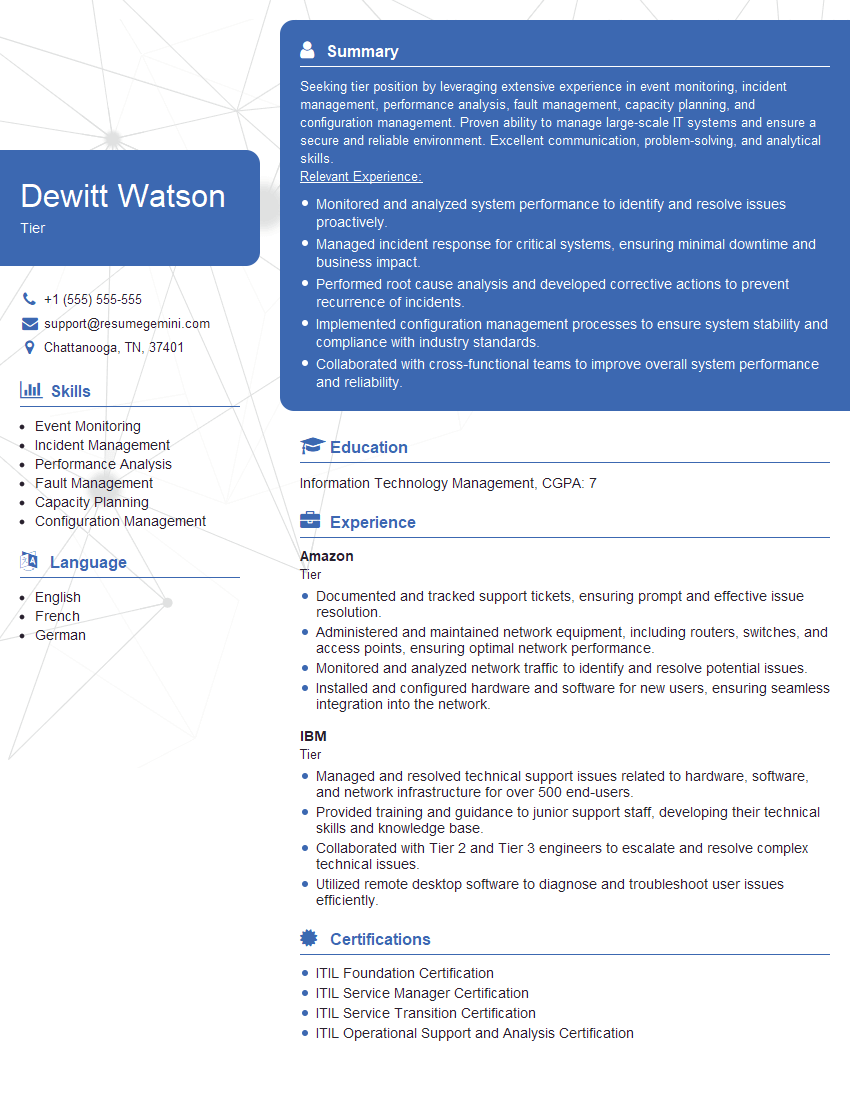Are you a seasoned Tier seeking a new career path? Discover our professionally built Tier Resume Template. This time-saving tool provides a solid foundation for your job search. Simply click “Edit Resume” to customize it with your unique experiences and achievements. Customize fonts and colors to match your personal style and increase your chances of landing your dream job. Explore more Resume Templates for additional options.

Dewitt Watson
Tier
Summary
Seeking tier position by leveraging extensive experience in event monitoring, incident management, performance analysis, fault management, capacity planning, and configuration management. Proven ability to manage large-scale IT systems and ensure a secure and reliable environment. Excellent communication, problem-solving, and analytical skills.
Relevant Experience:
- Monitored and analyzed system performance to identify and resolve issues proactively.
- Managed incident response for critical systems, ensuring minimal downtime and business impact.
- Performed root cause analysis and developed corrective actions to prevent recurrence of incidents.
- Implemented configuration management processes to ensure system stability and compliance with industry standards.
- Collaborated with cross-functional teams to improve overall system performance and reliability.
Education
Information Technology Management
February 2017
Skills
- Event Monitoring
- Incident Management
- Performance Analysis
- Fault Management
- Capacity Planning
- Configuration Management
Work Experience
Tier
- Documented and tracked support tickets, ensuring prompt and effective issue resolution.
- Administered and maintained network equipment, including routers, switches, and access points, ensuring optimal network performance.
- Monitored and analyzed network traffic to identify and resolve potential issues.
- Installed and configured hardware and software for new users, ensuring seamless integration into the network.
Tier
- Managed and resolved technical support issues related to hardware, software, and network infrastructure for over 500 end-users.
- Provided training and guidance to junior support staff, developing their technical skills and knowledge base.
- Collaborated with Tier 2 and Tier 3 engineers to escalate and resolve complex technical issues.
- Utilized remote desktop software to diagnose and troubleshoot user issues efficiently.
Certificates
- ITIL Foundation Certification
- ITIL Service Manager Certification
- ITIL Service Transition Certification
- ITIL Operational Support and Analysis Certification
Languages
- English
- French
- German
Career Expert Tips:
- Select the ideal resume template to showcase your professional experience effectively.
- Master the art of resume writing to highlight your unique qualifications and achievements.
- Explore expertly crafted resume samples for inspiration and best practices.
- Build your best resume for free this new year with ResumeGemini. Enjoy exclusive discounts on ATS optimized resume templates.
How To Write Resume For Tier
- Highlight your strong technical skills in event monitoring, incident management, and performance analysis.
- Showcase your ability to manage large-scale IT systems and ensure a secure and reliable environment.
- Emphasize your communication, problem-solving, and analytical skills.
- Quantify your accomplishments with specific metrics and results whenever possible.
- Tailor your resume to the specific job description and company you are applying to.
Essential Experience Highlights for a Strong Tier Resume
- Monitor and analyze system performance to identify potential issues and trends.
- Manage incident response for critical systems, ensuring minimal downtime and business impact.
- Perform root cause analysis and develop corrective actions to prevent recurrence of incidents.
- Implement configuration management processes to ensure system stability and compliance with industry standards.
- Collaborate with cross-functional teams to improve overall system performance and reliability.
- Participate in capacity planning and performance tuning to optimize system performance.
- Maintain up-to-date knowledge of industry best practices and technologies related to tier management.
Frequently Asked Questions (FAQ’s) For Tier
What is the role of a Tier?
A Tier is responsible for managing and maintaining the performance and availability of critical IT systems and applications. They monitor system performance, respond to incidents, perform root cause analysis, and implement corrective actions to ensure a secure and reliable IT environment.
What skills are required to be a successful Tier?
Successful Tiers possess strong technical skills in event monitoring, incident management, performance analysis, fault management, capacity planning, and configuration management. They also have excellent communication, problem-solving, and analytical skills, and a deep understanding of industry best practices and technologies.
What is the career path for a Tier?
Tiers can advance their careers by taking on more senior roles within IT management, such as IT Manager, Director of IT Operations, or CIO. They can also specialize in a particular area of expertise, such as cloud computing, cybersecurity, or data analytics.
What is the salary range for a Tier?
The salary range for a Tier varies depending on experience, location, and industry. According to Salary.com, the average salary for a Tier in the United States is between $80,000 and $120,000 per year.
What is the job outlook for Tiers?
The job outlook for Tiers is expected to be good over the next few years. As businesses become increasingly reliant on technology, the demand for skilled IT professionals who can manage and maintain complex IT systems will continue to grow.
What are some tips for writing a standout Tier resume?
To write a standout Tier resume, highlight your strong technical skills, showcase your ability to manage large-scale IT systems, emphasize your communication, problem-solving, and analytical skills, and quantify your accomplishments with specific metrics and results.
What are some common interview questions for Tiers?
Common interview questions for Tiers include questions about your experience in event monitoring, incident management, performance analysis, fault management, capacity planning, and configuration management. You may also be asked about your communication, problem-solving, and analytical skills.
How can I prepare for a Tier interview?
To prepare for a Tier interview, review your resume and be prepared to discuss your experience in event monitoring, incident management, performance analysis, fault management, capacity planning, and configuration management. You should also practice answering common interview questions and be prepared to talk about your communication, problem-solving, and analytical skills.